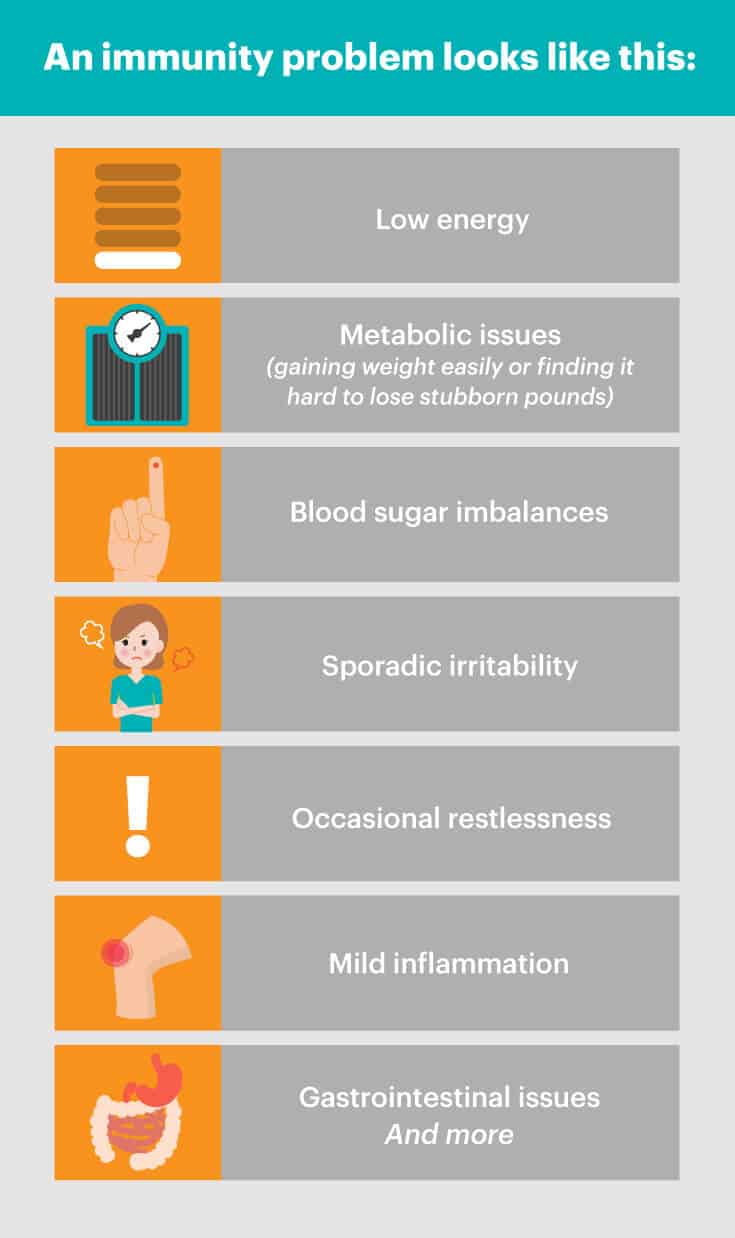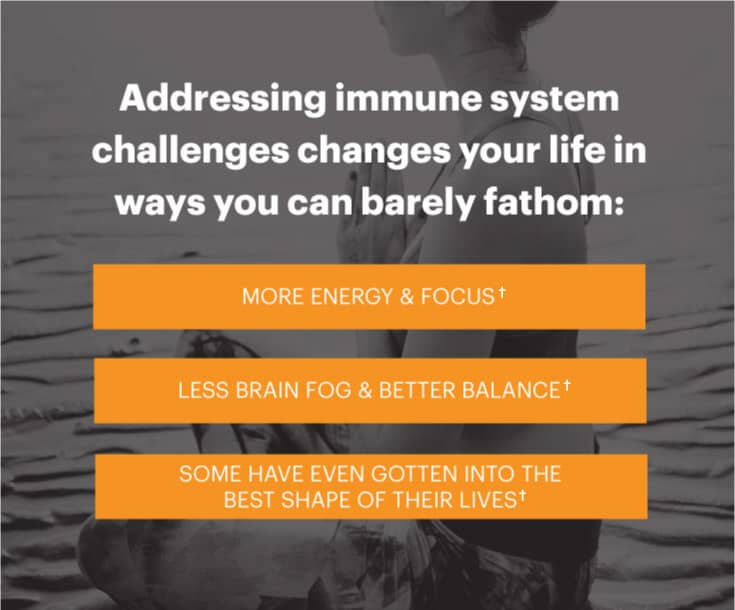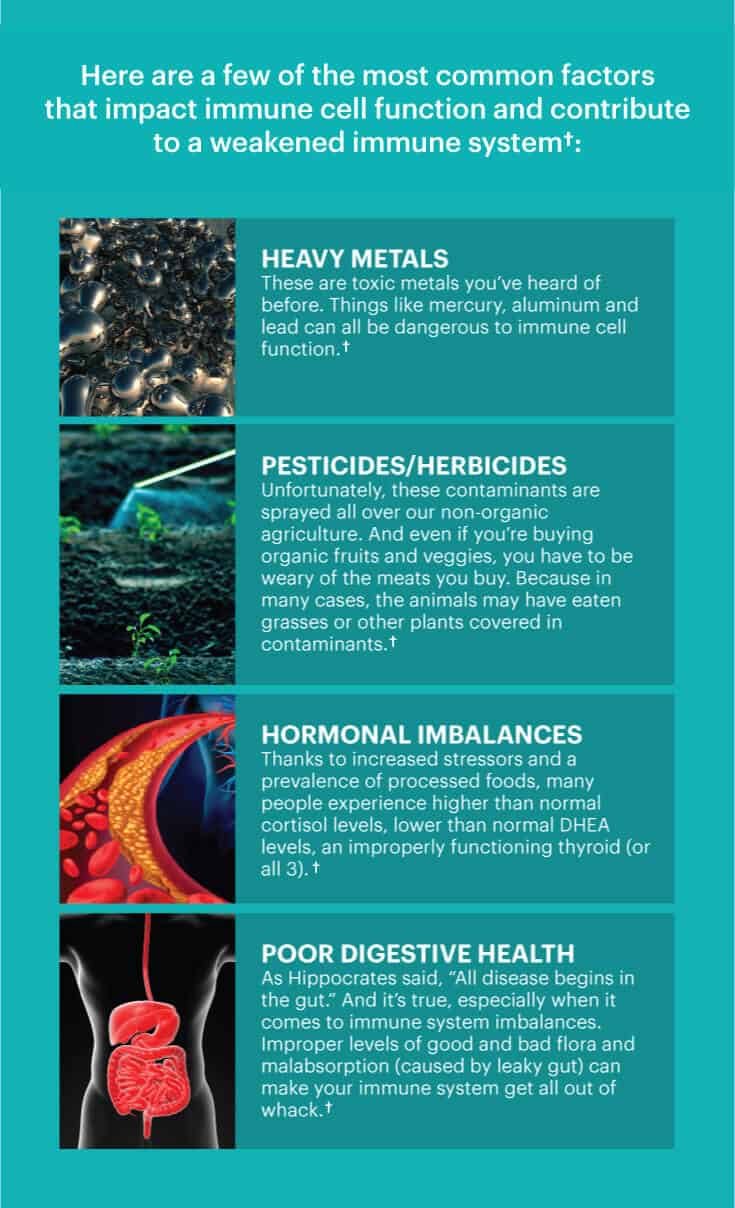Today you’ll discover the key to better digestion, radiant skin, more energy and so much more: your immune system.
You know immune system helps protect you from bacteria and other invaders. But you might not know it also impacts virtually every other system in your body — from your hormones to your nervous system.
Understanding this fact means two things:
1. Pinpointing immune issues can be challenging. Since immune issues can rear their ugly head in many ways, any one — or all — these things could be linked to an immunity problem†.

Truth be told: If you have one (or many) of these symptoms, you could have an immune issue and not even know it.†
But it also means…
2. Supporting your immune system can completely revolutionize your health†. Even a small improvement can dramatically influence the way you look, feel and even think every day.
I know because a few years ago I helped my mom overcome a major health crises and a host of immune system challenges.
Within days of addressing these issues, she noticed:
- Clearer thinking
- More energy
- And better sleep
A few months later, she looked years younger. She says,
“I feel better now than I did 20 years ago!”
Today, my mom is in the best shape of her life. She water skis every summer. Here she is waterskiing at age 60!

She’s making up for years of feeling sick and exhausted and living her life to the fullest every single day.
But it’s not just her. I’ve got thousands of success stories. People report complete transformations after addressing immunity issues.
We’re talking about people who went from lethargic to energetic, from “foggy” and unfocused to attentive and sharp, from “soft” and unfit to lean and strong.†

Today, I’ll show you how to do the same.
But before I tell you how to support your immune system, let’s talk about how your immune system works and where issues originate.
But before I tell you how to support your immune system, let’s talk about how your immune system works and where issues originate.
What Exactly Is Your Immune System?
Your immune system is a collection white blood cells scattered throughout your body. And there are two major goals for immune cells:
- Addressing issues INSIDE your cells.
- Attacking infections on the OUTSIDE of the cells.
Almost every healthy person will have enough of both types of cells, fully functioning and performing their critical roles.
But problems arise when things interfere with these cells’ ability to respond to the areas they influence.†
In the modern world, these interferences are becoming all too common.

Addressing heavy metal and pesticide issues is possible. Especially if we take steps to reduce our exposure to harmful compounds. With a few tweaks to your shopping list (buy organic) and lifestyle choices (avoid mercury-rich fish), you can see improvements almost immediately. And over time, you can see radical improvements in your health.
But when it comes to addressing the remaining two issues, we have to look much deeper into our diets and digestive system.
Optimizing Your Digestion: The Key to Immunity and Better Health
When it comes to fighting potential immune issues, digestion is key. Here are two of the most important steps you can take:
Step 1. Seal Your Leaky Gut†
Leaky gut syndrome is a rapidly growing condition. In fact, millions of people are struggling with it and don’t even know it. From the sound of it, you might think leaky gut only affects the digestive system, but in reality it can lead to many other health challenges.
According to research, the cause of your food allergies, low energy, joint discomfort, thyroid issues and immune challenges could be leaky gut symptoms spreading throughout the body.
Thankfully, you can get some quick wins on this front. Two huge wins involve:
Removing Toxic Foods From Your Diet
Some foods are notoriously toxic to your immune system.
Foods to avoid include:
- Sugar and sweeteners: Excess sugar will wreak havoc on your immune system faster than almost anything else. That includes avoiding everything from high-fructose corn syrup to artificial sweeteners as well. Be aware that sugar is an additive in many breads, condiments and dressings. Try to avoid as much extra sugar as possible.
- Processed and microwaved foods: Highly processed foods have TONS of preservatives and fillers. Those things are hard to digest. And over time, they wear out your body’s energy, digestion cycle, and immune system. Try to buy food on the outer w
 alls of your grocery store (organic vegetables/fruits and grass-fed meats) and prepare your own food whenever possible.
alls of your grocery store (organic vegetables/fruits and grass-fed meats) and prepare your own food whenever possible. - Hydrogenated oils: Vegetable oils like soybean, canola and corn oil are highly inflammatory and can lead to inflammation. Try to only use good fats such as coconut oil, olive oil, organic butter or ghee, as these can be soothing on your gut and great for your immunity.
Loading Up Bone Broth
 Bone broth is one of the best natural sources of collagen, a type of protein that’s needed to form tissue that makes up the lining of the GI tract. Collagen supports the lining of the digestive tract. And it can work wonders for leaky gut. Increased intake can help strengthen and normalize mucus membranes in the GI lining, close tiny junctures and stop undigested food particles and chemicals from leaking out of the gut into the bloodstream.
Bone broth is one of the best natural sources of collagen, a type of protein that’s needed to form tissue that makes up the lining of the GI tract. Collagen supports the lining of the digestive tract. And it can work wonders for leaky gut. Increased intake can help strengthen and normalize mucus membranes in the GI lining, close tiny junctures and stop undigested food particles and chemicals from leaking out of the gut into the bloodstream.
When collagen breaks down, gelatin is formed
, which is known to help people dealing with food allergies and sensitivities. Gelatin in bone broths contains “conditional” amino acids called arginine, glycine, glutamine and proline, which have certain anti-aging effects. And they’re incredibly powerful for your immune system.†
, which is known to help people dealing with food allergies and sensitivities. Gelatin in bone broths contains “conditional” amino acids called arginine, glycine, glutamine and proline, which have certain anti-aging effects. And they’re incredibly powerful for your immune system.†
Step 2. Consume probiotic-rich foods
While Vitamin D and Vitamin C get all the attention with regard to immune health, probiotic-rich foods are equally — if not more — important.
Probiotics are good bacteria that help you digest nutrients, detoxify your colon and balance out and support your immune system.†
Some of the top probiotic foods for immune system health include:
- Fermented vegetables like sauerkraut and kimchi —

Made from fermented cabbage and other vegetables, sauerkraut isn’t diverse in probiotics but is high in organic acids (what gives food its sour taste) that support the growth of good bacteria. While sauerkraut is extremely popular in Germany, kimchi is a close cousin and is the Korean take on cultured veggies. Both of the fermented formulas are also high in enzymes that can aid digestion and, thereby, boost your immune system.
- Fermented dairy products like kefir and goat milk yogurt —

Similar to yogurt, kefir is a fermented dairy product with milk and fermented kefir grains. Kefir has been consumed for well over 3,000 years, and the term kefir was started in Russia and Turkey and means “feeling good.” It has a slightly acidic and tart flavor and contains anywhere from 10 to 34 strains of probiotics. Kefir is similar to yogurt, but because it’s fermented with yeast and more bacteria, the final product is higher in probiotics.
- Kombucha —

Kombucha is an effervescent fermentation of black tea that’s started by using a SCOBY, also known as a symbiotic colony of bacteria and yeast. Kombucha has been around for over 2,000 years, originating near Japan. Many claims have been made about kombucha, but its primarily health benefits include digestive support, increased energy and support for immunity against bacteria and other invaders.
If you make sure your digestion is strong, you can take your immune system to the next level. These probiotic foods will absolutely help you with that aim.
With that said, consuming all of these foods and avoiding all of these toxins on a daily basis isn’t always practical.
That’s why I believe in supplementing a balanced diet and healthy lifestyle with a few key, high-quality immune-supporting supplements.
That’s why I believe in supplementing a balanced diet and healthy lifestyle with a few key, high-quality immune-supporting supplements.
To see what I personally use and recommend to support my gut and immune system health, click here.†
† These statements have not been evaluated by the Food and Drug Administration. This product is not intended to diagnose, treat, cure or prevent any disease.


No comments:
Post a Comment